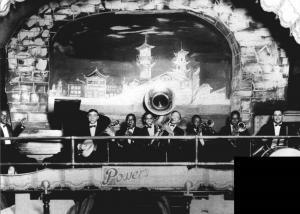
Ollie Powers’ Harmony Syncopators
Ollie Powers is an obsure figure in the shadows of early Jazz history in Chicago, though, as will be seen from the personnel given below,
Redhotjazz.com was a crown jewel of the early internet. Starting in the mid ’90s it made the offline discographies and biographies of early jazz available to the online public. It also hosted thousands of audio files donated by people who were digitizing their 78 RPM record collections, making many obscure recordings available for the first time. This all started long before Youtube and even before Wikipedia was much more than an idea.
We are duplicating the content of the Red Hot Jazz Archive from a snapshot saved in Archive.org’s Wayback Machine. Keeping with both the original intent and mission of Redhotjazz.org everything will be publicly available outside of our paywall. For ease of use we are improving each entry to meet the norms of the phone friendly modern internet.
The downloadable music files are mostly MP3s but some are in the ancient Real Audio (.ra) format. Rather than opening a new tab so you can stream or download them the Real Audio files will immediately download when you click them. Don’t be frightened. You don’t need Real Audio player to play them but they won’t work on Windows Media Player. We recommend the free and open source VLC player.
For more information read: About the Archive

Ollie Powers is an obsure figure in the shadows of early Jazz history in Chicago, though, as will be seen from the personnel given below,
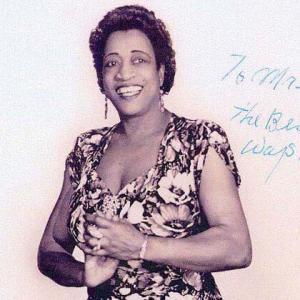
Ida Cox (February 26, 1888 or 1896 – November 10, 1967) sang in church choirs as a child in Georgia. She ran away from home
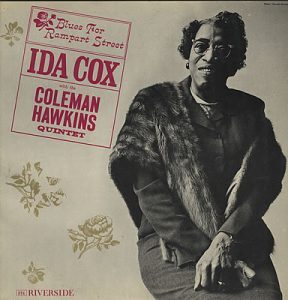
Title Recording Date Recording Location Company Blues for Rampart Street 4-12-1961 New York, New York Riverside RLP 374 Cherry Pickin Blues (Ida Cox) 4-12-1961 New
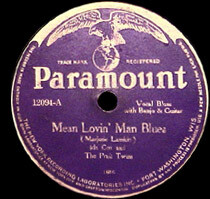
Title Recording Date Recording Location Company Down The Road Bound Blues (Robert Warfield) 3-1924 Chicago, Illinois Paramount 12094-B Mean Lovin’ Man Blues (Majorie Lamkin) 3-1924
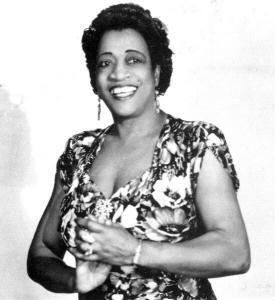
Title Recording Date Recording Location Company Aching Blues (Misery Blues) 1-1925 Chicago, Illinois Silvertone 3563 Blue Kentucky Blues (Gene Burdette) 1-1925 Chicago, Illinois Paramount 12258
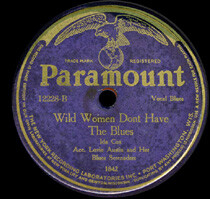
Title Recording Date Recording Location Company Black Crepe Blues (Jesse Crump) 4-1925 Chicago, Illinois Paramount 12291 Blues Ain’t Nothin’ Else But! (Ida Cox / J. Mayo
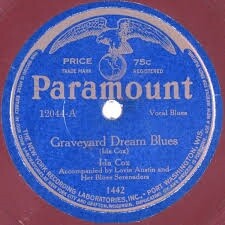
Title Recording Date Recording Location Company Come Right In (Ida Cox) 8-1923 Chicago, Illinois Paramount 12022 Graveyard Dream Blues (Jimmy Cox / Ida Cox) 10-1923
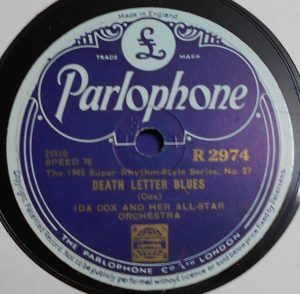
Title Recording Date Recording Location Company I Ain’t Gonna Let Nobody Break My Heart 12-20-1940 New York, New York Okeh unissued I Can’t Quit That
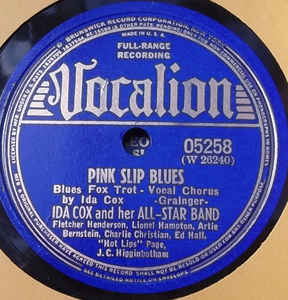
Title Recording Date Recording Location Company Death Letter Blues (Ida Cox / Jessie Crump) 10-31-1939 New York, New York Vocalion 05336 Deep Sea Blues 10-31-1939 New
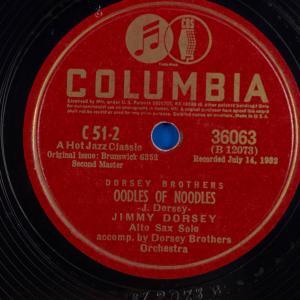
This was a single record made under this confusing name, for the primary entries see: Dorsey Brothers Orchestra Jimmy Dorsey (1904-1957) Tommy Dorsey (1905-1956) Title
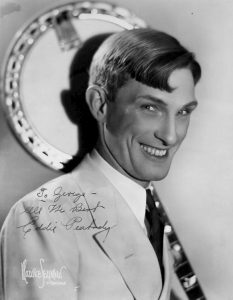
Eddie Peabody (February 19, 1902 – November 7, 1970), the “King of the banjo”, was not only a superb banjoist but also a great showman
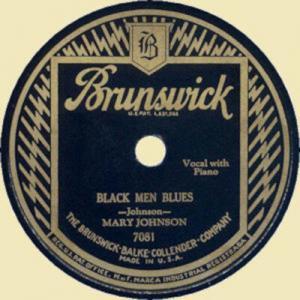
Blues singer Mary Johnson (March 29, 1898 or 1900 – July 20, 1983) got her start in show business as a teenager in St. Louis.
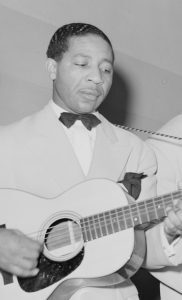
Lonnie Johnson (February 8, 1899 – June 16, 1970)was a pioneering Blues and Jazz guitarist and banjoist. He started playing in cafes in New Orleans
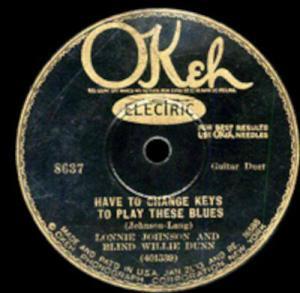
Blind Willie Dunn was a pseudonym that guitarist Eddie Lang’s records were released under when he teamed up with Lonnie Johnson on the Okeh label. Although the November on
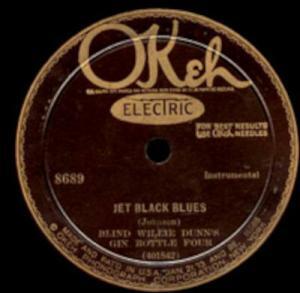
Blind Willie Dunn was a pseudonym that guitarist Eddie Lang usually used when he teamed up with Lonnie Johnson. Even the songwriter’s credit on these records was listed
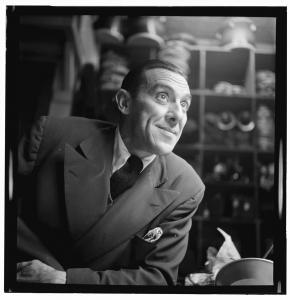
Wingy Manone (February 13, 1900 – July 9, 1982) was a New Orleans trumpet player and vocalist who lost his right arm in a streetcar
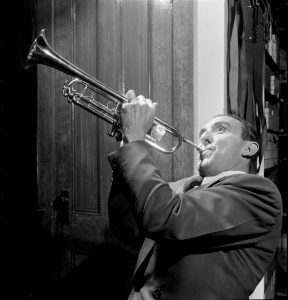
Wingy Manone was a New Orleans trumpet player and vocalist who lost his right arm in a streetcar accident when he was ten years old.
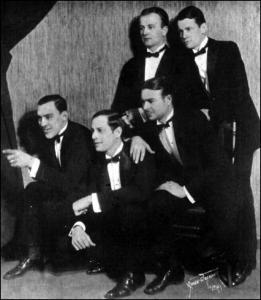
The Arcadian Serenaders were a group of White New Orleans musicians who played at the Arcadian Ballroom in St. Louis. The 1924 sessions are the
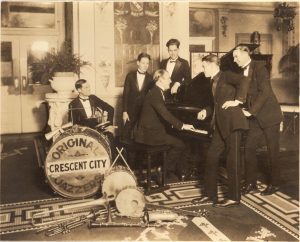
Originally from Mobile, Alabama, the Original Crescent City Jazzers later went by the name of the Arcadian Serenaders after moving to St. Louis in 1925. Trumpet player
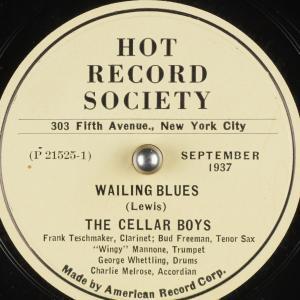
Wingy Manone was the leader of the Cellar Boys. They played at a club in Chicago called My Cellar. Title Recording Date Recording Location Company Barrel
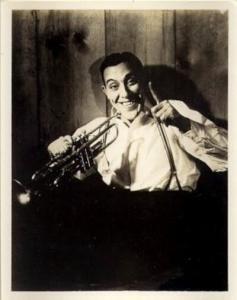
If you listen to “Tar Paper Stomp ” you can hear that Glenn Miller’s famous hit record “In The Mood” is based upon this song. Title
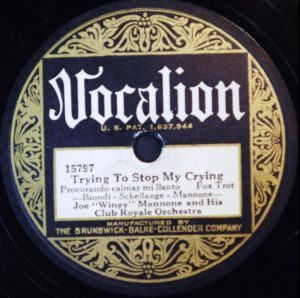
Title Recording Date Recording Location Company Downright Disgusted (Bud Freeman / Terry Shand / Wingy Manone) 9-4-1928 Chicago, Illinois Vocalion 15728 Fare Thee Well (Peck Kelly /
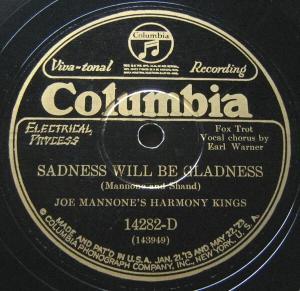
Title Recording Date Recording Location Company Cat’s Head (Wingy Manone / Hal Jordy) 4-11-1927 New Orleans, Louisanna Columbia 14282-D Ringside Stomp (Stan Miller) 4-11-1927 New Orleans,
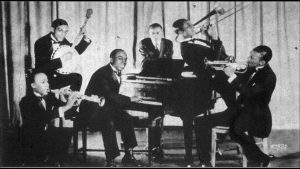
Thanks to Robert English for his help with some of the recordings on this page. Title Recording Date Recording Location Company All That I Had





